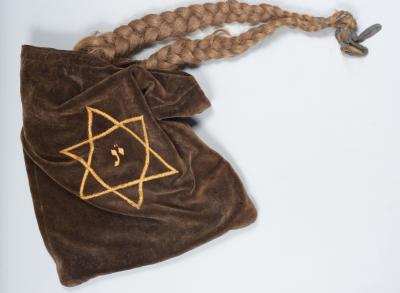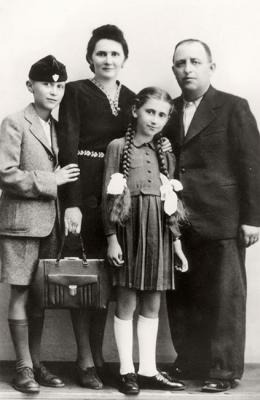When the decree was issued ordering all the Jews of Targu Mures, Transylvania, to leave their homes and relocate to the ghetto, Shaul and Rivka Hirsch prepared their children, 14-year-old Yitzhak and 12-year-old Lili, for the move. Rivka wanted to cut off Lili’s long braids, knowing that conditions in the ghetto would make hair-care impossible, but Lili refused to part with her long tresses. As a result of her mother’s pleas, and the promise that the braids would be safeguarded along with the family’s belongings in a neighbor’s house, Lili complied and the braids were cut.
The Hirsch family was incarcerated in the Targu Mures ghetto for 6 weeks, after which they were deported to Auschwitz-Birkenau. There, the men and women were separated, and both Rivka and Lili were sent to the gas chambers.
Shaul and Yitzhak were sent to Block 21, which was inhabited largely by gypsies. About a week later, Shaul was transferred to Auschwitz I, and from that moment on, young Yitzhak was alone.
When an epidemic of scarlet fever broke out in Block 21, the infected inmates were sent to their deaths, while the rest were kept in quarantine. As luck would have it, Yitzhak had been taken out of the Block by the deputy Blockaelteste, and thus evaded the epidemic.
Some two months after arriving at Auschwitz, the prisoners, Yitzhak among them, were forced on a death march. They were marched to the Lieberose camp, and from there to the Sachsenhausen camp. As the Germans retreated, some 17,000 prisoners were sent from Sachenhausen to the Mauthausen camp, and from there to the Gunskirchen camp. In the course of less than a month, most of the prisoners perished.
Yitzhak managed to survive, and was liberated by the Americans. He was transferred to a refugee camp, where, still suffering from typhus, he found out that his father had survived, and was in the Feldafing DP camp in Germany. Despite his frail physical condition, Yitzkhak left the refugee camp immediately and boarded a train that took him to his father.
In September 1945, Shaul and Yitzhak returned to their home in Targu Mures. They discovered that all that remained of the family belongings stored at the neighbors, were Lili’s braids, safe inside her father’s tallith (prayer-shawl) bag. Father and son took the braids with them as a last memory of Lili, and a memento of their destroyed home.
Yitzhak studied medicine in Targu Mures in the years following the war, and in 1962, Shaul and Yitzhak immigrated to Israel.
Yad Vashem Artifacts Collection
Donation of Dr. Yitzhak Hirsch, Kiryat Haim, Israel








